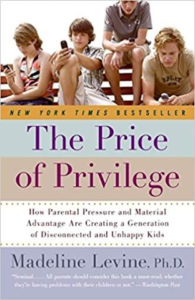
The Price of Privilege
By Madeline Levine
224 pages
Published in 2006 by Harper Collins
The Price of Privilege is two books in one. It’s a critique of how some affluent parents in America today handicap their children’s chances of living good and healthy lives by consciously or unconsciously transmitting the wrong values. It’s also a primer for new parents that want to improve their children’s chances of living happy and fulfilled lives through love and discipline.
The first several chapters are devoted to arguing that the problem with spoiled little rich kids isn’t trivial. These are children that are likely to develop low self-esteem; suffer anxiety and depression; are less likely to become accomplished, autonomous adults; and are, in some cases, prone to drug addiction, self-abuse, and even suicide.
This may be true, but I found myself thinking, “Yes, but why should I care?”
The rest of the book is more pragmatic. Levine delves into the common mistakes that affluent parents make and how they can be avoided by substituting actions that will have more positive effects.
For example, she talks about what she calls “maladaptive perfectionism,” which she defines as an intense need to avoid failure and appear flawless. This, she says, comes from parents that want the outside world to see them, and their family, as flawless.
She does not suggest that parents refrain from setting standards. “High expectations are found to promote achievement and competency in children,” she says. “[But] it is when a parent’s love is experienced as conditional on achievement that children are at risk for serious emotional problems.”
Levine on Materialism: She sees an emphasis on materialism as a major issue in terms of the development of bad ideas, habits, and behaviors. She makes the point that although affluence provides some significant benefits, such as good private schools, tutors, extra-curricular coaching, and family trips abroad, the abundance of such benefits can have the adverse effect of limiting the educational and developmental experiences that the child would otherwise have on his own.
Levine on Permissive Parenting: Parents should not feel guilty about monitoring the behavior of their children. They should set clear but fair rules and then be consistent in applying them.
Levine on Educational Success: Parents should encourage curiosity, creativity, individual thinking, and intellectual courage, rather than simply grades.
Levine on Solving Problems: Parents should resist the urge to rush in and solve their children’s problems, whether they be at home, at school, or on the playground. Instead, they should talk about possible solutions, and from there teach their children the skills they need to put those solutions into action.
Levine on Behavior Management: Self-control, including anger management, frustration tolerance, and the ability to delay gratification, are learnable skills, not immutable traits. Parents should work on teaching their children these skills at a very young age.
The Price of Privilege is not a book that felt important to me, like The Coddling of the American Mind. But I would recommend it to new parents – or new grandparents, for that matter.
Critical Reviews
* “[Madeline Levine] offers solid, proactive strategies for becoming a more connected, relaxed parent.” (Chicago Tribune)
* “This book has resonated in affluent communities all over the country. [Levine is] clearly on to something.” (Atlanta Journal-Constitution)
* “Alas, [Levine] may be preaching to the choir. Those who need her most may be too busy shopping to pick up such a dire-looking volume. Still, school guidance counselors should be happy to have this clear, sensitive volume on their bookshelves.” (Publishers Weekly)
